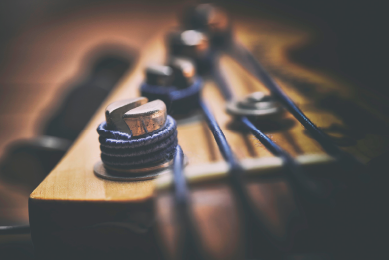
© Ogrim / shutterstock.com
Otolaryngologist Jeffrey Feldman, MD, had no idea the effect his younger brother, Brett, would have on his free time. Dr. Feldman, who earned his degree from the State University of New York Health Science Center and performed his residency at the University of California San Diego, first picked up the bass guitar when, in 1998, his brother called to say, “I’m moving to Rhode Island—I need someone to jam with, so you need to pick up an instrument.”
Since then, Dr. Feldman has split his time between his practice, ENT Associates of Westerley, R.I., and his band, Occidental Gypsy, a nationally touring acoustic act that plays a blend of gypsy swing, jazz, and world music.
ENTtoday: How did you begin with Occidental Gypsy?
Dr. Feldman: Initially, we were a Django Reinhardt cover band. [Editor’s note: Belgian-born Romani-French jazz guitarist and composer Django Reinhardt was the first jazz talent to emerge from Europe in the 1930s.] We did that for a while, touring locally, and then thought we needed to write some original music. We put out our first album, added a drummer—we’d previously been two guitars, a bass guitar, and a violin—and started doing some touring regionally and nationally. We still tour today, and we’ve released our second album.
My medical practice partner has sometimes wondered, “How do you manage to get away for a two-week touring gig?” I told him it’s the same as when he gets away with his family—he has four little girls all below the age of 12. My daughter’s in grad school, so I have free time, and music is what I choose to do with that free time.
Operating for four hours requires continuous ongoing focus on a lot of different things. When you’re playing music, especially jazz, you have to focus in the same way—there’s a lot of improvisation, and you have to concentrate to get it all right.
ENTtoday: When did you become interested in medicine?
Dr. Feldman: After I found out I couldn’t be an airline pilot. I always had an affinity for math and science, and I really wanted to be a commercial pilot. At that time, though, you had to have good uncorrected vision, so I needed to find a plan B.
There are no doctors in my immediate family, and I really didn’t know what I wanted to do until my second year of college. I’d think, “Why are all these people taking organic chemistry? Oh, it’s to go to medical school. Maybe I should take organic chemistry!” I did well, so I thought, “Maybe I should go to medical school.” I wasn’t sure what specialty I wanted to go into; I don’t think most students do in their first year or so, unless they have a family member who practices medicine.
My first clinical rotation during my third year was internal medicine, and by the end of the 12 weeks, I really questioned whether I wanted to be a physician at all. I was disheartened by the fact that it seemed that patients came in to get “tuned up,” went back to their lives, and then came back just as sick as they were before. It just seemed like a revolving door of critically ill people, and it just seemed futile.
My next rotation was surgery, and everyone coming off of surgery rotation was complaining of the long hours and being treated poorly, but I just loved it. I knew it was what I went to medical school for. I went into otolaryngology because there were some really good mentors in the specialty at my medical school, and the otolaryngology department was extremely strong there. I did some research with one of the fellows, and found I really enjoyed otolaryngology. It has a little of everything—men, women, young, old, small- and large-scale surgery, dealing with plating bones like an orthopedic surgeon, doing very fine microvascular work, and more.
ENTtoday: Do you use any of your musical skills in medicine?
Dr. Feldman: I find it’s actually the other way around. Operating for four hours requires continuous ongoing focus on a lot of different things. When you’re playing music, especially jazz, you have to focus in the same way—there’s a lot of improvisation, and you have to concentrate to get it all right.
ENTtoday: What’s your favorite thing about music?
Dr. Feldman: The fact that there isn’t anyone, I think, other than a musician who’s tired of playing, who can make the following statement: “I don’t like music.” I don’t care what culture you’re from, what socioeconomic group you fall under, or what your political affiliation is, there’s some music that you really enjoy.
ENTtoday: What’s your favorite thing about medicine?
Dr. Feldman: Definitely the impact I have in other people’s lives. There are so many sayings about health: “If you have your health, you’re rich,” and, “There’s nothing more important than your health.” As a physician, you can make people’s lives better with the most important thing in their life—their health. What could be better than that?
For more about Dr. Feldman’s band, visit occidentalgypsyband.com.
Amy E. Hamaker is a freelance medical writer based in California.